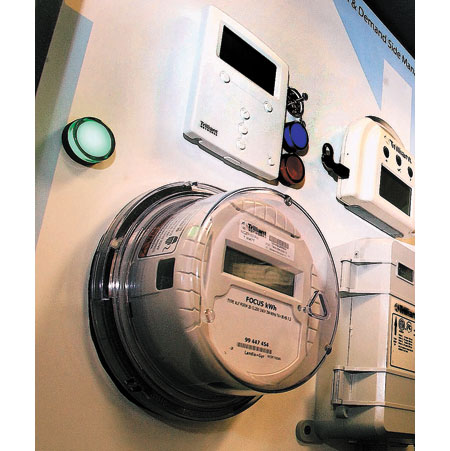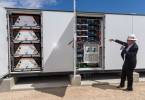Smart meters suggest savings
Here's your chance to weigh in: NV Energy wants to give you control over how much you pay for your electricity.
"Inconceivable," you snort. "This, from the company that charges the equivalent of Andorra's gross domestic product for air conditioning in July?"
Believe it, said Michael Yackira, president and chief executive officer. The power utility won $138 million in federal stimulus funds Tuesday for a three-year, $298 million project to replace every electric meter in Nevada with a smart meter executives say will let ratepayers direct energy use year-round.
Some research shows consumers could pare power bills as much as 50 percent a month with the new technology. Yackira said the company needs to test those claims in a pilot program, and that the $160 million NV Energy must invest in the initiative probably will appear in power rates later.
NV Energy's grant was part of $3.4 billion in government funds given to 100 projects aimed at modernizing the nation's power grid. In addition to smart meters, the grants also will pay for automation at utility substations, digital transformers and grid sensors. The grants ranged from $400,000 to $200 million.
Announcing the awards Tuesday in Florida, President Obama said a modern grid could give consumers more control over power costs and spur development of renewable energy.
Meters now give NV Energy information on power consumption at home. NV Energy collects those statistics and sends them to ratepayers as a monthly bill.
Smart meters will reverse the informational flow, allowing NV Energy to send detailed consumption numbers to consumers via a small plug-in display inside the home. Among figures on tap would be how much your bill is so far in the month, what the cost of power per kilowatt was and what it will be in the next hour, and perhaps even what you could save if you unplugged energy vampires such as plasma-screen televisions.
The idea is to show consumers real-time energy costs and empower decisions on reducing electric bills. For example, ratepayers who notice a cheaper cost per kilowatt on the schedule in two hours could wait until then to run their dishwasher.
Maximizing the possibilities of smart metering will require changes to state regulations, which prohibit charging residential customers based on hourly or peak rates and call instead for blended averages. But Yackira said he expects the state Public Utilities Commission to sign on to the hourly rate modification, partly because the agency sent the federal government a letter supporting the Advanced Service Delivery grant.
The difference in hourly charges could be stark. The cost per kilowatt hour in summer ranges from 3 cents during low demand to 20 cents at peak use. Once or twice in 2008, hydroelectricity sold to Nevada from the Pacific Northwest was so abundant in winter that it literally cost nothing for NV Energy to acquire. The utility wants ratepayers to see those cheaper prices and be able to opt for them, and it wants thriftier users to reap the rewards of conservation rather than subsidize customers who aren't judicious about their energy use.
The meters also will let customers switch to renewable-energy sources at the push of a button. That means the homeowner who can't afford a rooftop solar array can still embrace green power, Yackira said. Eventually, the meters might let customers set a specific amount they can afford to pay for power in a given month, and have NV Energy's meter system tell them how to achieve that bottom line.
"The more information our customers have, the more they will be cognizant of the energy use they can control within the home," Yackira said. "Therefore, they can reduce that consumption and lower their bill. They're taking an active rather than a passive role."
The initiative will create 200 meter-installation jobs at NV Energy, as well as many more jobs bringing in computer equipment, consulting on a new billing system and marketing the program to consumers, Yackira said.
NV Energy expects to launch its pilot program by late 2010, with plans to install all 1.45 million smart meters in the state by the end of 2012.
Robert Boehm, director of the Center for Energy Research at the University of Nevada-Las Vegas, said the system could boost conservation.
"Too often, we pay a price for something, and that price may not include what the real cost is," said Boehm, who is working with NV Energy and Pulte Homes to build smart-power technology into Pulte's Villa Trieste community in Summerlin.
"What they've found in places where people know the real costs is that consumers become a little more careful about how they use power. They don't leave every light in the house on all the time when they don't need those lights."
Tamping down on peak demand also will let NV Energy avert pricey spot-market buys to cover surging summer use, and it will help the company avoid powering up spare generating capacity that might not be as efficient as its everyday plants, Boehm said.
But some say smart grids might not make that much economic sense for households. Consumers will save money on their power bill, but as taxpayers, they're on the hook for that $138 million subsidy, as well as the broader $3.4 billion federal expenditure. Consumers also will have to pay for at least some of the $160 million NV Energy puts up to finish the job in the form of higher rates to offset capital investment.
"I'm always leery of things that require federal money," said Ben Lieberman, senior policy analyst for energy and the environment at the Heritage Foundation's Thomas A. Roe Institute for Economic Policy Studies. "Why do they require government subsidies? My feeling is that the fact that these things require federal money is a red flag they might not make much sense. If they did, the private sector would undertake them."
Lieberman didn't discount the smart grid in principle, saying the initiative is so general it probably has some positive elements. Nor did he downplay the importance of public policy in promoting the grid, perhaps by streamlining overlapping local, state and federal regulations that make such developments difficult.
But government handouts don't make fiscal sense, he said, and it's not clear whether consumers will save much if the higher costs of new infrastructure get passed on to taxpayers and power customers.
More worrisome to Lieberman are high-tech energy systems that might let utilities stem consumers' energy use against their will. People consume energy to perform functions that improve their lives, he said, and focusing too much on reducing energy use could harm quality of life.
"Anything that interferes with consumers' ability to use energy as they see fit could hurt in ways that don't show up in dollars and cents," Lieberman said. "I could save you a lot of gas if I stole your car, but that wouldn't help you in the long run."
Yackira countered that the money ratepayers will save on electric bills will "dwarf" the initiative's upfront costs. The payback period for the company would be a few years, and customers would see savings immediately, Yackira noted. The company would have proceeded with Advanced Service Delivery even without federal funds, though the rollout would have happened more slowly, he said.
Yackira also promised that NV Energy won't reach into ratepayers' homes to tamper with the temperature in mid-summer without permission. (The utility does run a voluntary CoolShare program that reimburses participants who accept brief, peak-period shutdowns of air-conditioning.)
It will be completely up to ratepayers to decide how extensively they participate in any conservation programs NV Energy might offer through smart metering, much like consumers choose from different tiers of cell-phone or cable-TV service.
NV Energy will test Advanced Service Delivery in up to 140,000 homes. Even if consumer response isn't as robust as NV Energy expects, it will be worth it, Yackira said. The utility will enjoy lower operational costs, and even slightly better peak-load management could forestall the need for new power plants, which ratepayers ultimately finance.
What's more, Yackira said, smart meters will help NV Energy detect power outages in "nanoseconds," before the consumer has a chance to call about the supply hiccup.
And then there's the good will that comes with giving ratepayers a say in their bills.
NV Energy will work with the Public Utilities Commission to identify service areas for the pilot program.
Contact reporter Jennifer Robison at jrobison @reviewjournal.com or 702-380-4512. The Associated Press contributed to this report.





























